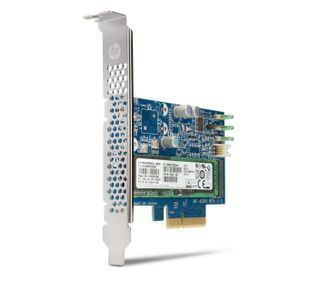NVMe Storage Ecosystem Expands; Apple, HP And Motherboard Vendors Step Forward
AHCI has been the de facto consumer storage interconnect since 2004, but it was originally designed for spinning disks and suffers numerous performance limitations. SSDs have transformed the nature of our storage devices, and the AHCI interface isn't efficient enough to fully utilize today's flash-based storage devices.
A consortium of 90 companies came together to forge a new specification to propel storage into the future. The NVMe (Non-Volatile Memory Express) interface is a refined interface that exploits the inherent advantages of non-volatile memory, such as massive parallelism and low latency, to provide faster performance. NVMe is memory-agnostic, and it was not designed with NAND specifically in mind. NVMe's focus on faster future memory technologies (PCM, MRAM) infuses the interface with more than enough speed for today's SSDs.
The NVMe ecosystem is expanding rapidly. Numerous vendors have released new SSDs, Apple jumped onboard, and motherboard vendors are adding support. Let's take a quick jog through the latest NVMe news.
Apple Updates OS X Yosemite
New protocols require broad support from both hardware and software vendors. There are already NVMe whitebox drivers included in Windows and Linux distributions, but Apple has been a notable holdout. Apple updated its hardware to PCIe-connected storage devices several years ago but opted to stick with the trusty AHCI interface.

Apple is the world's largest single consumer of flash products, and when it decides to move to a new technology, people take notice. The latest Apple OS X 10.10.3 Yosemite update has a small but important addition to the hardware overview pane of the Mac's System Report -- an NVMExpress entry. Native support in Yosemite sends a clear message that Apple intends to deploy NVMe SSDs into its laptops in the future. Apple doesn't support TRIM for third party SSDs, and readers will need to ensure compatibility before purchase.
UFS and eMMC are jockeying to be the interface of choice for mobile applications, but Apple has indicated that it intends to support NVMe for mobile devices in the future. Marvell has already displayed embedded NVMe controllers on a single NAND package, and the latest enhancements to the NVMe spec lower power consumption for mobile devices. It is only a matter of time before we see NVMe expand into the mobile segment.
HP Unveils HP Z Turbo Drive G2...Wait, Isn't That Samsung?
HP recently announced its m.2 Z Turbo Drive G2 with the NVMe interface. The first generation of this product is a re-badged Samsung PCIe 2.0 XP941, and it's possible the G2 version is simply an upgrade to a faster NVMe-capable PCIe 3.0 x4 Samsung SM951. HP simply stated that the SSD utilizes Samsung NVMe technology. We recently took an in-depth look at the SM951, albeit without the NVMe interface.
Stay on the Cutting Edge
Join the experts who read Tom's Hardware for the inside track on enthusiast PC tech news — and have for over 25 years. We'll send breaking news and in-depth reviews of CPUs, GPUs, AI, maker hardware and more straight to your inbox.
Availability of the new Z Turbo Drive G2 is slated for June. Many expected Samsung's SM951 to launch with the NVMe interface, but the SSD arrived with the AHCI protocol. The AHCI SM951 is only available through a select few retailers, such as RamCity, but it wouldn't be entirely surprising if Samsung announced an NVMe version soon, or an entirely new m.2 NVMe SSD.

The Z Drive G2 offers incredible speeds of 2,150 MBps sequential read and 1,260/1,550 MBps sequential write for the 256/512 GB capacity points. Random read IOPS weigh in at a blistering 300,000, and the G2 provides an equally impressive 100,000 write IOPS. The performance specifications are much higher than the AHCI version of the SM951. The 256 GB ($399) and 512 GB ($699) SSDs offer 146 TB and 292 TB of write endurance, respectively.
The Intel 750 is the only other NVMe drive on the market for consumer applications, and it comes in PCIe AIC (Add In Card) and 2.5" form factors. The new HP SSD provides more endurance than the Intel NVMe products but isn't quite as fast. The HP Z Drive G2 is shaping up as the go-to SSD for those on the hunt for an NVMe-powered m.2. HP is officially offering the SSDs as upgrades for its HP Z840, Z640 and Z440 workstations, but we can imagine a world where enthusiasts snap these up for desktop systems. In either case, there are rumblings coming from Samsung's direction, and we expect it to announce a retail version of this SSD soon. The usual warnings about ensuring compatibility apply.
Motherboard Vendors Pile On
The Intel 750 Series requires a Z97, X99 or H97 motherboard with UEFI version 2.3.1 or higher. Intel has considerable clout with the motherboard vendors, and support has emerged faster than expected. MSI led the NVMe charge with NVMe support in January, and Gigabyte and Asus both announced compatibility last week. (Hit the links for detailed compatibility matrixes.) We advise readers to ensure compatibility with other SSDs, such as the forthcoming HP offering.
Are We Done Yet?
Well, that is the latest NVMe news from around the watercooler. Or should we say the firehose? We expect to be continuously inundated with NVMe news as more devices work their way to market. Stay tuned.
Follow us @tomshardware, on Facebook and on Google+.

Paul Alcorn is the Managing Editor: News and Emerging Tech for Tom's Hardware US. He also writes news and reviews on CPUs, storage, and enterprise hardware.
-
ShermOR When Intel releases the Skylake chip set NVMe & PCIe 3.0 X4 want have to a work around solution we have now.Reply -
ShermOR ReplyWhen Intel releases the Skylake and 100 series chipset NVMe & PCIe 3.0 X4 want have to be a work around solution we have now.
When Intel releases the Skylake chip set NVMe & PCIe 3.0 X4 want have to a work around solution we have now.
-
tical2399 I need a nvme m.2 pcie 3.0 drive for my x99 sli plus. I have the xp 941 pcie 2.0 4x drive now and while its fast I want as faster boot drive and i'll use the xp 941 for onedrive and media storageReply -
Elchi If you are an owner of an older ASUS MB (z77, x79, z87) please vote for NVme support !Reply
http://pcdiy.asus.com/2015/04/asus-nvme-support-poll-voice-your-opinion/
Most Popular

